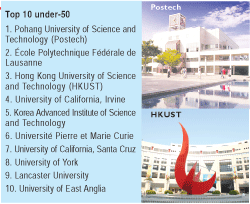Korea: Postech: Best under-50 university
The Republic of Korea’s Pohang University of Science and Technology has topped the first Times Higher Education ranking of 100 best universities under the age of 50, leading a strong showing for East Asian universities.
 The THE 100 Under-50 aims to show which nations are challenging the US and UK as higher education powerhouses — and offers insights into which institutions may be future world leaders. The list uses the same 13 performance indicators as the THE World University Rankings, but with a reduced weightage for subjective indicators of academic reputation. East Asian nations contribute six institutions to the top 20, with Pohang (known as Postech) at number one (see box).
The THE 100 Under-50 aims to show which nations are challenging the US and UK as higher education powerhouses — and offers insights into which institutions may be future world leaders. The list uses the same 13 performance indicators as the THE World University Rankings, but with a reduced weightage for subjective indicators of academic reputation. East Asian nations contribute six institutions to the top 20, with Pohang (known as Postech) at number one (see box).
Founded just 26 years ago, Postech has benefited from investment by Posco, one of the world’s largest steel companies — plus support from the Republic of Korea’s government during a time when the nation was completing its rapid transformation into an advanced industrial and technological economy. The UK takes five places in the Top 20 and more institutions in the 100 Under-50 than any other nation, with 20 representatives.
Writing in THE’s supplement to accompany the rankings, Jamil Salmi, former tertiary education coordinator at the World Bank, notes that the creation of new universities with global ambitions is an important trend in higher education, citing notable ventures in emerging economies such as Kazakhstan and Saudi Arabia. He argues it “may be easier to reach world-class status by establishing a new institution than by attempting to upgrade an existing one.” “As Postech and HKUST have shown, convincing large numbers of overseas scholars to return to their country of origin is an effective way of building up the academic strength of an institution rapidly,” he says.
Additional factors he identifies as keys to success in the ranking include the use of English as the main working language — a key factor in attracting leading foreign academics — and concentration on niche areas such as the sciences and engineering, enabling the rapid achievement of critical mass in research.
(Excerpted and adapted from Times Higher Education)















Add comment